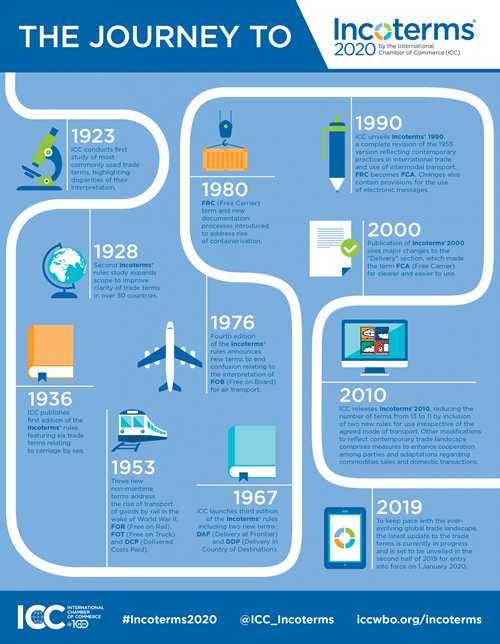Learn the importance of these standardized terms for the Foreign Trade. Be updated with the main changes in 2020´s version
The Incoterms are a set of rules defined by the International Chamber of Commerce (ICC). They were created in order to standardize the terms agreed between companies while they arrange a Foreign Trade Agreement.
As time goes on, this set of rules needs to be reviewed, updated and aligned. At the beginning of each decade, new solutions are proposed for the sake of some identified necessary improvements and then new contents are created to better the commercial negotiations among the nations.
What do the INCOTERMS establish?
The Incoterms establish the exporter´s and importer´s responsibilities for Foreign Trade transactions. It contains the obligations related to:
- :: The risks of each party;
- :: The costs for each party;
- :: Insurance;
- :: Customs Dispatches;
- :: Delivery time and deadlines.
In commercial operations, either the exporter or the importer has interest and responsibility for the cargo. By establishing the obligations of each party in their mutual Agreement, it is not compulsory to adhere and use all the terms of the Incoterm modality chosen. It is possible to customize it by inserting the relevant aspects only.
However, it is necessary to be attentive while indicating these conditions in the Agreement. So to have the Incoterms application validated, it is mandatory to cite it clearly. On the contrary, the terms won´t be take into consideration in a lawsuit because they have no power before the law.
In addition, there are other aspects to be included in the Agreement which are not contemplated by the Incoterms as follows:
- :: Pricing of the goods;
- :: Requirements and restrictions;
- :: Modalities of payment;
- :: Insolvency;
- :: Conformities;
- :: Major force circumstances;
- :: Agreement termination.
It is important to be assured the Incoterms portray exclusively the obligations of export and import companies. They have no effects on third parties who may be somehow involved in the operation as handling, doing the following-up or transporting the goods. Thus, the transport Agreement, Insurance, payments and professionals are not supported by it.
Why were the Incoterms updated in 2020?

In the infographic above, released by ICC, it is possible to verify each change and updating included in the Incoterms since its creation. The last version made available was 2010´s which comprised of 11 terms. However, the newest version was released globally in September 2019 and went into effect in January 2020. So far it is available only in English and one may acquire it from ICC Knowledge 2 Go. An English-Portuguese version is expected to be released soon
The current Agreements based on Incoterms 2010 will go on valid according to its version even if performed from 2020 on. It is highly recommended to declare in the Agreement the Incoterms version to avoid misunderstandings.
What are the main changes in the Incoterm 2020?
Itens for Incoterms 2020
For any Means of Transport:
- EXW: Ex Works
- FCA: Free Carrier
- CPT: Carriage Paid To
- CIP: Carriage and Insurance Paid To
- DAP: Delivered at Place
- DPU: Delivered at Place Unloaded
- DDP: Delivered Duty Paid
For Maritime and River Transport, only:
- FAS: Free Alongside Ship
- FOB: Free on Board
- CFR: Cost and Freight
- CIF: Cost Insurance and Freight
Main changes applied
- The DAT term (Delivered At Terminal) was replaced by DPU (Delivered at Place Unloaded) to explicit the delivery can be done at any nominated place and not only at a terminal
- The Bill of Lading (BL) must be issued on board for FCA transactions soon after the shipment departures. Then, the seller must send the BL to the buyer to enable the cargo dispatch at the destination.
- The deliveries of FCA, DAP and DDP will have the transport recognized by their own means.
- CIP term will demand the Insurance with full coverage.
- The parties´ obligations will have explicit requirements for transport security and costs.
- The operational costs were re-organized and the full list is in a specific section of the manual.
- The terms have a detailed explanatory entry for its use, risk transference and how to organize costs.
- The Incoterms may be used for purchase and sale in the domestic market.
For the time being, you are updated with the main aspects of Incoterms 2020 and you may understand how fundamental they are for Foreign Trade segment. All in all, before arranging an Agreement with an overseas company make sure about the feasibility of the Transaction.

